This document summarizes a court case between Prime Time International Company and the US Department of Agriculture regarding tobacco assessments under the Fair and Equitable Tobacco Reform Act. The USDA assessed Prime Time, a manufacturer of small cigars, quarterly fees based on its market share of the cigar class. Prime Time appealed, arguing that treating all cigars equally failed to account for size differences and that alternative sales data should be used. The court upheld most of the USDA's assessment methodology but found that Prime Time correctly challenged the exclusion of some manufacturers and inclusion of certain expenses.
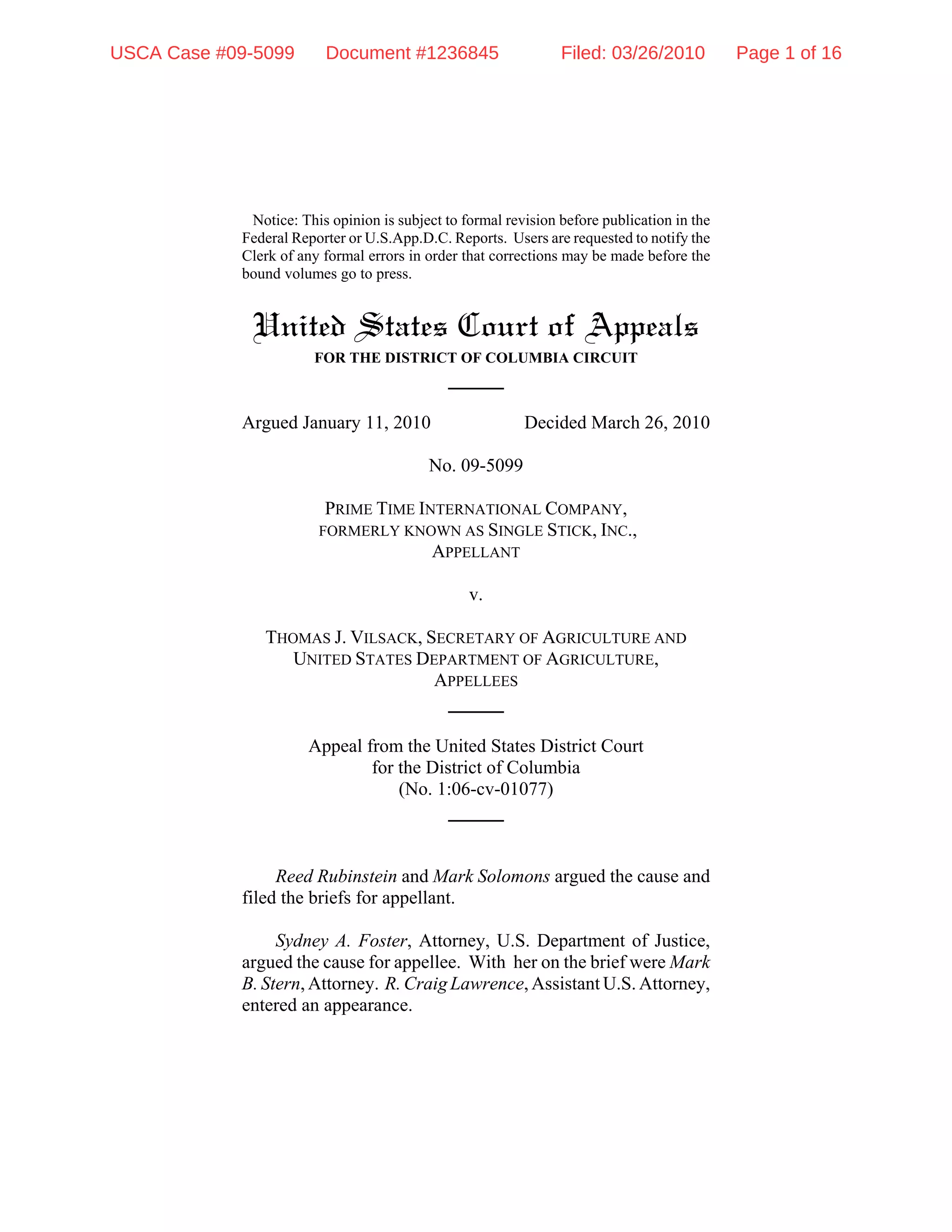
![2
Before: ROGERS and GRIFFITH, Circuit Judges, and
EDWARDS, Senior Circuit Judge.
Opinion for the Court by Circuit Judge ROGERS.
ROGERS, Circuit Judge: In 2004 Congress enacted the Fair
and Equitable Tobacco Reform Act (“FETRA”), 7 U.S.C. § 518
et seq., repealing a system of quotas and price supports for
tobacco production and providing for payments for ten years to
producers and persons who had established marketing quotas to
ease the transition. These payments are funded by quarterly
assessments on manufacturers and importers of tobacco
products. Prime Time International Company, a manufacturer
of small cigars, challenged its assessments for three quarters of
FY 2005, asserting claims under FETRA, the Information
Quality Act, 44 U.S.C. § 3516 note, and the Due Process Clause
of the Constitution. The district court granted summary
judgment to the Secretary and Department of Agriculture on the
FETRA and due process claims, and dismissed the IQA claim
pursuant to Federal Rule of Civil Procedure 12(b)(6) for failure
to state a claim. Our review is de novo, and we affirm in part
and reverse in part.
I.
Upon“repeal[ing]allaspectsoftheFederaltobaccosupport
program,” H.R. REP. NO. 108-755, at 440 (2004) (Conf. Rep.),
reprinted in 2004 U.S.C.C.A.N. 1341, 1518, Congress
established a ten-year transitional program under which the
United States Department of Agriculture (“USDA”) continues
to make payments to farmers formerly covered by marketing
quotas. 7 U.S.C. § 518e. The payments come from a newly
established Tobacco Trust Fund in the Commodity Credit
Corporation at USDA. Id. § 518e(a). The Trust Fund is
supported by quarterly assessments on tobacco manufacturers
USCA Case #09-5099 Document #1236845 Filed: 03/26/2010 Page 2 of 16](https://image.slidesharecdn.com/37352086-06d0-4f93-b314-61a6f9523704-160701201057/85/Prime-Time-DC-Circuit-Decision-2-320.jpg)
![3
1
Chapter 52 exempts from taxation several classes of
tobacco, including: “Tobacco products furnished for employee use or
experimental purposes”; “Tobacco products and cigarette papers and
tubes transferred or removed in bond from domestic factories and
exportwarehouses”;“Tobaccoproductsandcigarettepapersandtubes
released in bond from customs custody”; and “Tobacco products and
and importers. Id. § 518d(b). Under FETRA, assessments are
to be allocated among manufacturers and importers of six types
oftobacco:cigarettes,cigars,snuff,roll-your-own,chewing,and
pipe. Id. § 518d(c). The allocation within each class of tobacco
product “shall be . . . on a pro rata basis . . . based on each
manufacturer’s or importer’s share of gross domestic volume,”
with “[n]o manufacturer or importer . . . required to pay an
assessment that is based on a share that is in excess of [its] share
of domestic volume.” Id. § 518d(e)(1), (2). An individual
manufacturer’s or importer’s assessment within a class of
tobacco product is determined by multiplying its market share
of the tobacco class by the total amount of the assessment for the
tobacco class. Id. § 518d(f). “Market share” is defined as “the
share of each manufacturer or importer of a class of tobacco
product . . . of the total volume of domestic sales of the class of
tobacco product during the base period for a fiscal year for an
assessment . . . .” Id. § 518d(a)(3).
Congress set the class allocations for FY 2005, see id.
§ 518d(c)(1), while authorizing the Secretary of Agriculture to
adjust the allocations in subsequent years “to reflect changes in
the share of gross domestic volume held by that class of tobacco
product,” id. § 518d(c)(2). Gross domestic volume is defined as
“the volume of tobacco products removed (as defined by section
5702 of Title 26)” and “not exempt from tax under chapter 52 of
Title 26 at the time of their removal under that chapter or the
Harmonized Tariff Schedule of the United States,” neither of
which is germane.1
Id. § 518d(a)(2). “[R]emoved,” as used by
USCA Case #09-5099 Document #1236845 Filed: 03/26/2010 Page 3 of 16](https://image.slidesharecdn.com/37352086-06d0-4f93-b314-61a6f9523704-160701201057/85/Prime-Time-DC-Circuit-Decision-3-320.jpg)
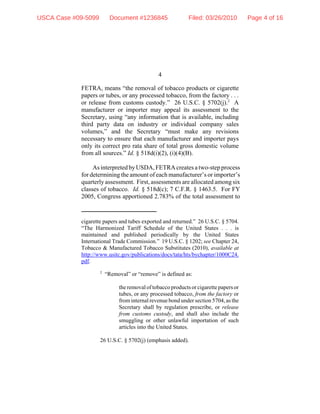
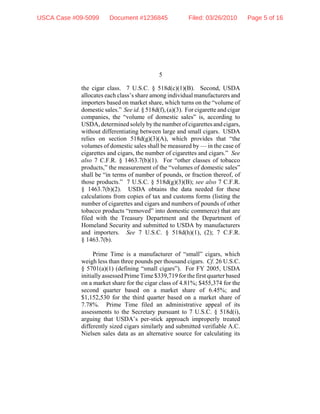
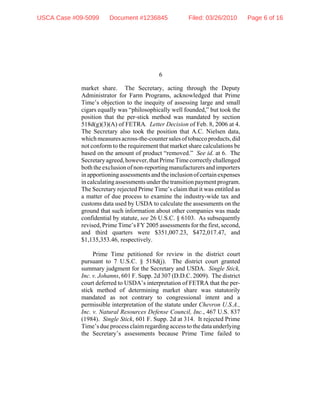
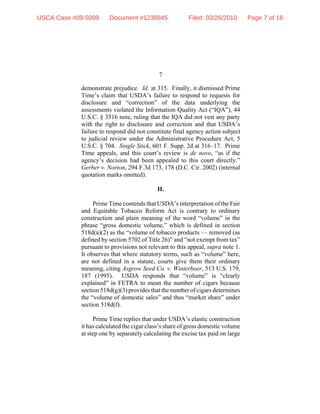
![8
and small cigars and then adding the two amounts. See 70 Fed.
Reg. 7007, 7008 (Table 1) (Feb. 10, 2005). But then, at step two,
USDA calculates the market shares for individual manufacturers
and importers based on their share of the “commingled number
of large and small cigars.” Reply Br. 5. This skips a necessary
step, Prime Time maintains, because FETRA requires that the
allocation within a tobacco class be “on a pro rata basis” with
“[n]o manufacturer or importer . . . required to pay an assessment
that is based on a share that is in excess of the manufacturer’s or
importer’s share of domestic volume.” 7 U.S.C. § 518d(e).
Therefore, it argues, after allocating the assessment by class of
tobacco products, USDA should divide the cigar class
assessment into sub-classes of large and small cigars, with the
relative allocation determined by total weight, and then divide
the assessments among individual large and small cigar
manufacturers and importers on a per-stick basis from the sub-
divided assessments, satisfying subsection (g)(3)(A). Prime
Time contends such a method is required by the plain text of
subsection (e) as well as subsection (i)(4)(B), which, upon
administrative appeal, requires the Secretary to “make any
revisions necessary to ensure that each manufacturer and
importer pays only its correct pro rata share of total gross
domestic volume from all sources.”
In interpreting a statute, the court begins with the text, and
employs“traditionaltoolsofstatutoryconstruction” todetermine
whether Congress has spoken directly to the issue. See Chevron,
467 U.S. at 842–43 & n.9. If so, the court’s task is at an end.
See id. at 842–43. USDA construes section 518d(g)(3)(A) of
FETRA to mandate the per-stick method for apportioning
assessments among individual manufacturers and importers
within the cigarette and cigar class without first sub-dividing the
cigar class into large and small cigars. In its view “[t]he statute
could hardly be more explicit.” Appellees’ Br. 15. It suggests
Swisher Int’l Inc. v. Schafer, 550 F.3d 1046 (11th Cir. 2008),
USCA Case #09-5099 Document #1236845 Filed: 03/26/2010 Page 8 of 16](https://image.slidesharecdn.com/37352086-06d0-4f93-b314-61a6f9523704-160701201057/85/Prime-Time-DC-Circuit-Decision-8-320.jpg)
![9
cert. denied, 130 S. Ct. 71 (2009), supports this interpretation.
However, Swisher provides no analysis, stating only that “[f]or
cigarette and cigar sellers, the individual assessments are
determined by the number of cigarettes and cigars sold,” while
for other tobacco classes, the number of pounds of tobacco is
used. Id. at 1050.
The plain text of FETRA does not self-evidently vindicate
USDA’s two step assessment method. Under FETRA, the
“volume of domestic sales” and “market share” are not
synonymous with “gross domestic volume.” FETRA provides,
for example, that “[t]he volume of domestic sales shall be
calculated based on gross domestic volume,” 7 U.S.C.
§ 518d(g)(2) (emphasis added), indicating two different
meanings for the terms. And section 518d(g)(3)(A) does not, on
its face, require that a compound number of large and small
cigars serve as the denominator when calculating a
manufacturer’s or importer’s volume of domestic sales on a per-
stick basis. Most critically, USDA’s interpretation appears to
ignore the pro-rata-basis limitation Congress imposed on
assessments within a tobacco class in subsection (e). As
interpreted by USDA, it is irrelevant that one large cigar
consumes far more tobacco than a small cigar, and so accounts
for a far larger segment of the market than its per-stick
contribution would indicate. Yet the text and structure of the
statute titled the Fair and Equitable Tobacco Reform Act
suggests an easy counting metric for cigarettes and cigars may
not override a statutory mandate that assessments be “allocated
on a pro rata basis” within each class of tobacco product, id.
§ 518d(e)(1). Prime Time’s interpretation suggests that there is
at least one way to interpret FETRA’s provisions consistently
and in harmony, with none made superfluous or insignificant.
See Corley v. United States, 129 S. Ct. 1558, 1566 (2009); City
of Anaheim, Cal. v. FERC, 558 F.3d 521, 522 (D.C. Cir. 2009).
USCA Case #09-5099 Document #1236845 Filed: 03/26/2010 Page 9 of 16](https://image.slidesharecdn.com/37352086-06d0-4f93-b314-61a6f9523704-160701201057/85/Prime-Time-DC-Circuit-Decision-9-320.jpg)
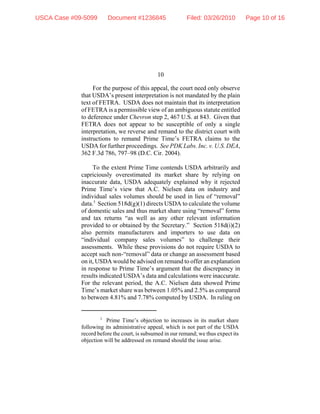
![11
Prime Time’s administrative appeal, the Secretary pointed out
that A.C. Nielsen data “is across-the-counter ‘sales’ data,”
tracking the number of cigars sold at the point of sale, while
under FETRA “[m]arket shares . . . are computed based on
tobacco product ‘removal’ data.” Letter Decision at 6; see 7
U.S.C. § 518d(a)(3),(g)(2),(a)(2). Because FETRA adopted the
definition of “removal” in 26 U.S.C. § 5702, supra note 2, the
Secretary concluded USDA had to rely on excise tax and
customs forms that report data on “removal.” By contrast,
becauseA.C.Nielsen’sover-the-counter sales data does not track
“removal,” it “[is] not (and will not be) synonymous” with
“removal” data. Letter Decision at 6. USDA was not required
to provide more of an explanation for rejecting Prime Time’s
suggestion it use A.C. Nielsen data instead of “removal” data.
See Tourus Records, Inc. v. Drug Enforcement Admin., 259 F.3d
731, 737 (D.C. Cir. 2001). Still, the discrepancy is troubling and
inasmuch as the Secretary’s explanation was based on his view
that section 518d(g)(3)(A) was dispositive, we leave open the
question whether, upon remand, A.C. Nielsen data may assume
significance should Prime Time renew its argument.
We do not address Prime Time’s contention that its due
process rights were violated when USDA refused to disclose the
tax and customs data underlying its FETRA assessments. On
appeal USDA advises that, with Treasury Department
agreement, certain previously unavailable industry-wide data
sought by Prime Time can now be disclosed without running
afoul of the tax confidentiality statute, 26 U.S.C. § 6103. See
Appellees’ Br. 34; 7 C.F.R. § 1463.8(b)(8). Any due process
challenge would therefore arise in a different context upon
remand.
USCA Case #09-5099 Document #1236845 Filed: 03/26/2010 Page 11 of 16](https://image.slidesharecdn.com/37352086-06d0-4f93-b314-61a6f9523704-160701201057/85/Prime-Time-DC-Circuit-Decision-11-320.jpg)
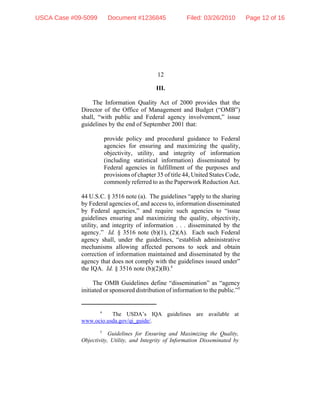
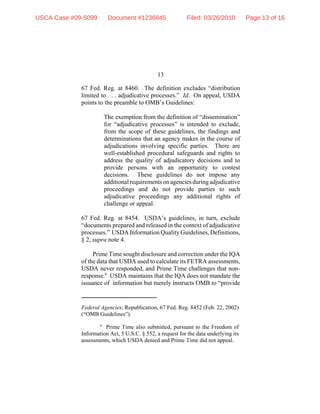
![14
policy and procedural guidance” for ensuring quality, utility,
and integrity of information. 44 U.S.C. § 3516 note (a). Prime
Time relies, however, on the provision that requires agencies to
“establish administrative mechanisms allowing affected persons
to seek and obtain correction of information maintained and
disseminated by the agency.” Id. § (b)(2)(B). Regardless,
because Congress delegated to OMB authority to develop
binding guidelines implementing the IQA, we defer to OMB’s
reasonable construction of the statute. See United States v.
Mead, 533 U.S. 218, 226–27 (2001). The IQA is silent on the
meaning of “dissemination,” and in defining the term OMB
exercised its discretion to exclude documents prepared and
distributed in the context of adjudicative proceedings. This is a
permissible interpretation of the statute, see Chevron, 467 U.S.
at 843, and Prime Time does not contend otherwise. Rather,
Prime Time attempts to avoid the consequences of the IQA
exemption for adjudications on the ground it is waived because
USDA did not raise it in the district court.
This court has repeatedly recognized that issues and legal
theories not asserted in the district court “ordinarily will not be
heard on appeal.” See, e.g., Horowitz v. Peace Corps, 428 F.3d
271, 282 (D.C. Cir. 2005); Hall v. Ford, 856 F.2d 255, 267 (D.C.
Cir. 1988); District of Columbia v. Air Florida, Inc., 750 F.2d
1077, 1084 (D.C. Cir. 1984) . The reasons for this rule are clear:
[O]ur procedural scheme contemplates that parties shall
come to issue in the trial forum vested with authority to
determine questions of fact. This is essential in order
that parties may have the opportunity to offer all the
evidence they believe relevant to the issues which the
trial tribunal is alone competent to decide; it is equally
essential in order that litigants may not be surprised on
appeal by final decision there of issues upon which they
have had no opportunity to introduce evidence.
USCA Case #09-5099 Document #1236845 Filed: 03/26/2010 Page 14 of 16](https://image.slidesharecdn.com/37352086-06d0-4f93-b314-61a6f9523704-160701201057/85/Prime-Time-DC-Circuit-Decision-14-320.jpg)
![15
Hormel v. Helvering, 312 U.S. 552, 556 (1941).
USDA did not raise the “exemption for adjudications”
argument in the district court, so normally it would be forfeited.
See generally United States v. Olano, 507 U.S. 725, 733 (1993).
However, in Singleton v. Wulff, 428 U.S. 106, 121 (1976), the
Supreme Court observed:
The matter of what questions may be taken up and
resolved for the first time on appeal is one left primarily
to the discretion of the courts of appeals, to be
exercised on the facts of individual cases. We
announce no general rule. Certainly there are
circumstances in which a federal appellate court is
justified in resolving an issue not passed on below, as
where the proper resolution is beyond any doubt, see
Turner v. City of Memphis, 369 U.S. 350 (1962).
The “proper resolution [of the IQA issue] is beyond any doubt,”
so this court is free to reach it. The issue involves a
straightforward legal question, and both parties have fully
addressed the issue on appeal. Consequently, no “injustice” will
be done if we decide the issue. Id. USDA’s determination of
Prime Time’s assessments for three quarters of FY 2005 was an
adjudication, attendant to which Prime Time had rights to an
administrative appeal and judicial review. See 5 U.S.C. § 551(7)
(defining “adjudication”); 7 U.S.C. § 518d(i), (j). Prime Time’s
contention that USDA violated the IQA when it did not respond
to a request to disclose and correct certain information
underlying the tobacco assessments thus fails.
Accordingly, we reverse the grant of summary judgment to
USDA on Prime Time’s FETRA claims, we do not reach its due
process claims in view of USDA’s representation about
requested data that will become available to Prime Time upon
USCA Case #09-5099 Document #1236845 Filed: 03/26/2010 Page 15 of 16](https://image.slidesharecdn.com/37352086-06d0-4f93-b314-61a6f9523704-160701201057/85/Prime-Time-DC-Circuit-Decision-15-320.jpg)
